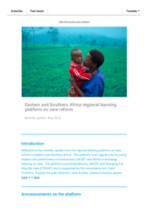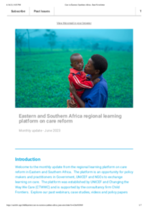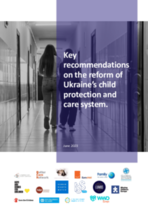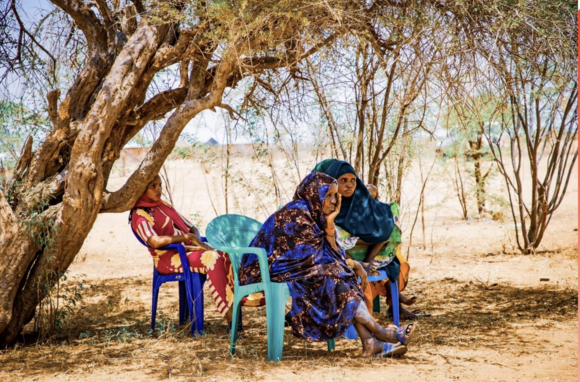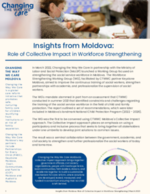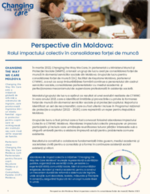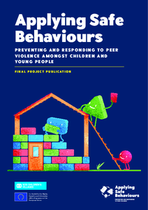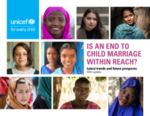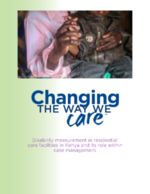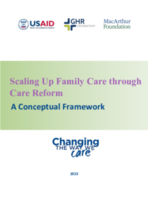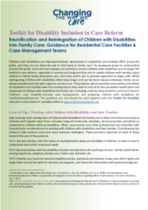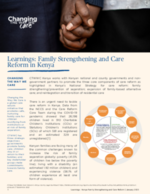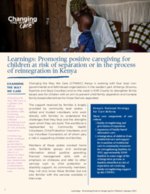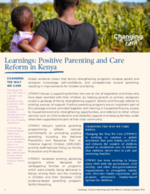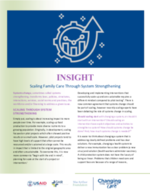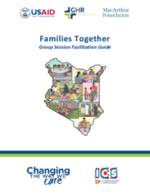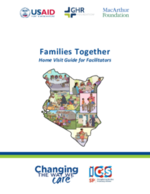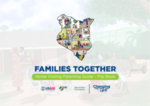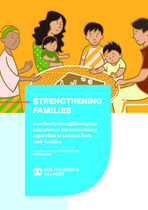Eastern and Southern Africa Regional Learning Platform: June 2023 Update
This is the monthly update of the Eastern and Southern Africa Regional Learning Platform published in June 2023.
Key Recommendations on the Reform of Ukraine's Child Protection and Care System
Sixteen NGOs with expertise in child protection, disability inclusion and human rights call on the Government of Ukraine and its international partners to implement these key recommendations on the development of an inclusive child protection and care system.
The National Framework for the Implementation of Kafaalah Care for Children in Kenya
This framework was developed to guide the process of taking in vulnerable children by families, whether they are related to the specific families or not and bringing them up the same way they bring up their biological children.
Moldova Insights: Role of Collective Impact in Workforce Strengthening
In March 2022, Changing the Way We Care in partnership with the Ministry of Labor and Social Protection (MoLSP) launched a Working Group focused on strengthening the social service workforce in Moldova.
Perspective din Moldova: Rolul impactului colectiv în consolidarea forței de muncă
În martie 2022, Changing the Way We Care, în parteneriat cu Ministerul Muncii și Protecției Sociale (MMPS), a lansat un grup de lucru axat pe consolidarea forței demuncă în domeniul serviciilor sociale din Moldova.
Applying Safe Behaviours - Preventing and Responding to Peer Violence
In the project “Applying Safe Behaviours”, SOS Children’s Villages is working to enable children, young people and professionals to prevent and appropriately respond to peer violence amongst children and young people in alternative care and vulnerable families.
Is an End to Child Marriage within Reach? Latest Trends and Future Prospects
The practice of child marriage has continued to decline globally. Today, one in five young women aged 20 to 24 years were married as children versus nearly one in four 10 years ago.
Disability Measurement in Residential Care Facilities in Kenya and its Role within Case Management
Though research has been conducted on children with disabilities and on children in residential care settings, the intersections of these two topics has yet to be explored in depth. Notably, there is a lack of information surrounding disability measurement within residential care settings, highlighting a gap in the literature. It is estimated that a child with a disability is 17 times more likely to be placed in an institutionalized care setting than a child without a disability, and girls are more likely to be placed in an institution than boys. This report details research conducted in Kenya.
Separating Families Causes Trauma
In the BBC interview below, parent activist Taliah Drayak presents key findings from the report: Children’s Social Care: The Way Forward. She describes her family’s own nightmare when social workers removed her two-year-old from her custody.
Scaling Up Family Care Through Care Reform: A Conceptual Framework
Changing the Way We Care prioritizes scaling family care as part of care reform. To support global efforts, CTWWC developed a conceptual framework to scaling within the countries where it works. The country-level conceptual framework presents scaling as a seven-step process. Scaling approaches vary across contexts and countries with there being no one-sized fits all approach.
Reunification and Reintegration of Children with Disabilities into Family Care: Guidance for Residential Care Facilities & Case Management Teams
This guidance aims to provide case workers and others at residential care facilities with the considerations they need to look at for the successful reunification and placement of children with disabilities into family care, including understanding disability and how it impacts children’s care, disability-inclusive case management, and preparing children with disabilities for reunification/placement.
Learnings: Family Strengthening and Care Reform in Kenya
This brief summarizes the original design of Changing the Way We Care’s family strengthening approach, the lessons learned during implementation, and the adaptations that CTWWC is making to maximize the impact of its family strengthening work.
Learnings: Promoting Positive Caregiving for Children at Risk of Separation or in the Process of Reintegration in Kenya
This CTWWC brief describes the family strengthening approach and the people who work with families and children. It shares reflections from facilitators of parenting sessions and the caregivers, themselves.
Learnings: Positive Parenting and Care Reform in Kenya
Positive parenting programs are an important part of this package and are provided together with training in household finance, access to household economic strengthening opportunities, and referrals to other critical services such as child protection and disability support and helping families under stress feel supported and part of their local community. This brief describes the program and interventions.
Insight: Scaling Family Care Through Systems Strengthening
This Changing the Way We Care Insights Learning Brief describes how systems strengthening alone can lead to scaling of interventions, including interventions that already exist.
Families Together: Group Session Facilitation Guide
This facilitator’s manual provides the detailed content for each session and should only be delivered by trained facilitators. For more information contact CTWWC through info@ctwwc.org or by SMS on 21437
Families Together: Home Visit Guide for Facilitators
This guide is part of the Families Together parenting curriculum for families who have a child reintegrating into the home.
Families Together: Home Visiting Parenting Guide – Flip Book
Families Together is a positive parenting program for use with families at risk of separation and families undergoing reintegration of children from residential care.
Families Together Parenting Curriculum
Families Together is a parenting curriculum for families who have a child reintegrating into the home. The program is an adapted version of the Skillful Parenting Programme, designed and delivered in Kenya by Investing in Children and their Societies (ICS).
Prendre soin des enfants vulnérables: Que signifie répondre à l'appel de Dieu pour les églises, les familles, les orphelinats et les autres formes prises en charge des enfants?
El cuidado de los niños vulnerables: ¿Qué significa responder al llamado de Dios para las iglesias, las familias, los orfanatos y otras formas de cuidado infantil?
Caring for Vulnerable Children: What Does Answering God’s Call Mean for Churches, Families, Orphanages, and Other Forms of Children’s Care?
Strengthening Families: How Family Strengthening Can Help Prevent the Unnecessary Separation of Children from their Families
This document makes the case for the importance of investing in family strengthening in countries across Central and Eastern Europe and Central Asia. It has a particular focus on support for families so that any unnecessary separation of children from their families and placement in alternative care can be prevented.

